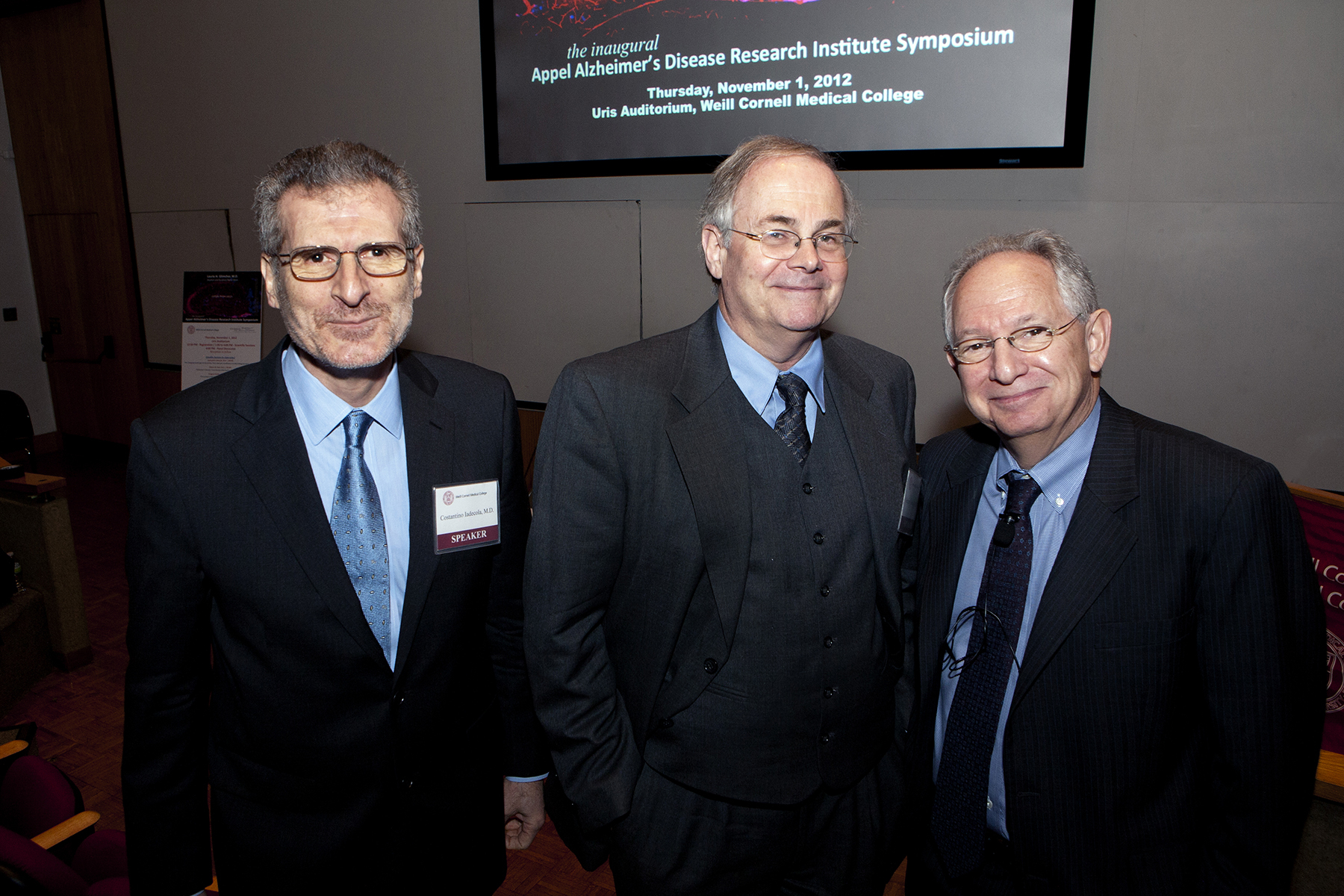Alzheimer's disease is one of today's most devastating afflictions, but according to Weill Cornell Medical College researchers, there is reason to have hope.
That was the message conveyed at the inaugural Appel Alzheimer's Disease Research Institute Symposium, hosted at Weill Cornell and sponsored by the Helen and Robert Appel Alzheimer's Disease Research Institute. The symposium brought together researchers and clinicians from diverse areas of research with the goal of better understanding the disease.
"I truly believe we are poised at the brink of coming up with treatments and, even more importantly, prevention strategies to combat Alzheimer's disease and other neurodegenerative diseases," said Dr. Laurie H. Glimcher, the Stephen and Suzanne Weiss Dean of Weill Cornell.

Dr. Costantino Iadecola, left, Dr. Gregory Petsko, center, and Dr. Steven Paul, left, are among the five featured speakers during the inaugural Appel Alzheimer's Disease Research Institute Symposium.
The symposium featured presentations from Dr. Steven Paul, director of the Helen and Robert Appel Alzheimer's Disease Research Institute and professor of neuroscience in the Brain and Mind Research Institute; Dr. Norman Relkin, associate professor of clinical neurology and associate professor of neuroscience in the Brain and Mind Research Institute; Dr. Costantino Iadecola, professor of neuroscience and director of the Brain and Mind Research Institute and the Anne Parrish Titzell Professor of Neurology; Dr. Gregory Petsko, the Arthur J. Mahon Professor and professor of neuroscience in the Brain and Mind Research Institute; and Dr. Matthew Fink, professor of clinical neurology and chairman of the Department of Neurology.
In their presentations, they traced the development of Alzheimer's disease diagnosis and treatment from Auguste Deter — the very first patient diagnosed by Dr. Alois Alzheimer with the disease in 1906 — to current drug therapies and clinical trials.
"We can now assess people — look at their genetic risk, in many cases, by measuring a gene or genetic risk factor," said Dr. Paul, also the Burton P. and Judith B. Resnick Distinguished Professor of Neurodegenerative Diseases and professor of psychiatry and pharmacology.

Dr. Norman Relkin speaks during the inaugural Appel Alzheimer's Disease Research Institute Symposium.
"We can then look at biomarkers to see whether that disease process has started in the brain. We can follow and track the progression of the disease, and hopefully intervene with a therapy that will actually modify the disease," Dr. Paul continued. "And if we go early enough, it is my belief, and the belief of many, that we might be able to not only slow the disease down, but potentially prevent it completely."
Alzheimer's disease, one of today's most devastating afflictions, affects five million Americans, with three caregivers for every patient. But by mid-century, as the baby boomer generation ages, there is expected to be more Alzheimer's patients than the current populations of New York, Los Angeles, Chicago and Houston combined — some 16 million people at a cost of $1 trillion a year.
"When we think about the impact of Alzheimer's disease in this country and around the world, it's a very sobering thought," Dr. Glimcher said.
But enormous advances have been made in Alzheimer's research these last few years, these researchers said, giving people a renewed sense of optimism.
"I think we are on the verge of disease-modifying therapies," Dr. Paul said. "We have a long way to go, but I think we are now able to test some clinical hypotheses for the first time that offer a ray of hope."
That's exactly the point of the Helen and Robert Appel Alzheimer's Disease Research Institute, supported by Helen and Robert Appel, longtime benefactors of the Medical College.
"The Appels understand how absolutely critical research and discovery is to eventually rid the world of this disease, which is virtually a medical epidemic," Dr. Glimcher said. "This is just one gift among many the Appels have made to Weill Cornell Medical College, and it isn't simply the gifts that tell the tale. The Appels have invested so much time and devotion and energy to this institution."

